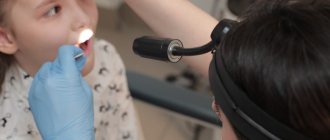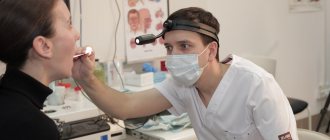Laryngitis is an inflammatory lesion of the mucous membrane of the larynx. The causes are infectious diseases, colds, as well as weakened immunity. Accompanied by swelling, local hyperemia of the throat, pain and other symptoms of intoxication. Treatment should be carried out on time, otherwise the trachea and other respiratory organs may be involved in the inflammatory process, provoking the appearance of laryngotracheitis and other pathological conditions.
Causes of laryngitis
The occurrence of laryngitis, in most cases, is facilitated by:
- Pneumonia.
- Bronchitis.
- Colds and flu.
- Allergic processes.
- Various injuries to the larynx.
- Polluted dry air.
- High load on the vocal cords.
- Burns of the mucous surface of the larynx due to chemical substances.
- Infections of viral, microbial and bacterial origin.
- Acute and chronic pathologies in the nasopharynx (sinusitis, sinusitis, pharyngitis).
The emotional state also plays an important role in the development of laryngitis. Systematic stress and nervous strain can contribute to the disease.
Publications in the media
Acute phlegmonous laryngitis is an acute inflammatory disease of the larynx, in which the purulent process spreads not only to the submucosal layer, but also to the muscles, ligaments of the larynx, and sometimes to the perichondrium and cartilage. The predominant age is middle. The predominant gender is men.
Etiology • Coccal flora (streptococci, staphylococci, pneumococci) • Combination of oral spirochete and spindle bacillus.
Risk factors • Injuries of the larynx (external, with damage to its mucous membrane) • Chemical and thermal burns of the larynx • Cooling • Peritonsillitis • Abscess of the root of the tongue • Laryngeal tonsillitis • Diphtheria of the larynx • Blood diseases (acute and chronic leukemia) • Sepsis • Rarely tuberculosis, syphilis , laryngeal cancer • Decreased local and general reactivity.
Clinical picture • Acute onset • General weakness, malaise • Febrile body temperature • Severe pain in the throat (with the development of an abscess of the epiglottis and aryepiglottic folds) • Hoarseness of voice, difficulty breathing, rough “barking” cough (with an inflammatory process in the glottis area) • Acute laryngeal stenosis (urgent tracheostomy required!) • Regional lymphadenitis.
Acute epiglottitis is one of the types of phlegmonous laryngitis, with the development of edema and abscess formation. Occurs more often in children.
• Risk factors • ARVI • Cooling of the whole body or larynx. • Etiology - a combination of viral infection (respiratory viruses) and coccal flora. • Clinical picture •• Acute and rapidly progressing onset •• Febrile body temperature •• Sharp pain in the throat, aggravated by swallowing •• Inspiratory shortness of breath and noisy breathing develop rapidly •• Hoarse voice. • Laryngoscopy. Inflammatory edema and infiltration, the formation of an abscess most often occurs on the lingual surface of the epiglottis. The epiglottis is intensely hyperemic, with an abscess visible through the mucous membrane. Laryngoscopy • Swelling, infiltration, abscess formation of the mucous membrane of the epiglottis, aryepiglottic folds, arytenoid cartilages or one half of the larynx with symptoms of perichondritis. Bright red color of the mucous membrane with islands of necrotic epithelium and thick mucopurulent discharge. With phlegmonous laryngitis, it is possible to limit the mobility of the arytenoid cartilages and vocal folds, which, in combination with swelling of the mucous membrane, leads to the development of increasing stenosis, asphyxia and death • Sometimes the process spreads beyond the larynx, which leads to deep abscesses of the neck, thrombosis of the internal jugular vein, mediastinitis.
Differential diagnosis • Laryngeal tonsillitis (inflammation of the mucous membrane of the pyriform pouches) • Edema of the larynx • Perichondritis of the larynx (often sequestered cartilage may be in a closed purulent cavity).
Treatment • Hospitalization in a specialized (otolaryngology) department • Broad-spectrum antibiotics, paralaryngeal administration of benzylpenicillin (sodium salt) • Sulfonamide drugs (sulfadimethoxine, sulfalene) • Antihistamines (promethazine, chloropyramine, clemastine, mebhydrolin) • GC (hydrocortisone, prednisolone) • Diuretics (for example, furosemide) • Locally: cervical novocaine blockades • Electrophoresis with 10% calcium chloride solution and 1% diphenhydramine solution to the larynx area • Inhalations (alkali-oil) • Infusion of 2% protargol solution into the larynx , rosehip, sea buckthorn and peach oils • In the presence of an abscess - open it • In acute laryngeal stenosis - urgent tracheostomy • If abscesses spread to the neck or mediastinum - open them in the neck or cervical mediastinotomy.
Prognosis • Favorable if the inflammatory process is uncomplicated • If complications develop, it depends on their severity.
ICD-10 • J04.0 Acute laryngitis • J05.1 Acute epiglottitis.
Clinical picture
As a rule, pathology manifests itself gradually. At first there are no symptoms. Subsequently, weakness, malaise, and possible fever are noted.
Unpleasant sensations occur in the larynx area. These are pain, burning, tickling, tickling and dryness. Afterwards a cough is registered, at first it is dry, then a copious amount of productive sputum appears. It may contain mucus, as well as admixtures of pus and sometimes blood.
As a result, the larynx becomes very inflamed, swollen, and becomes bright red. The voice shrinks, becomes hoarse, low and sometimes can disappear completely.
Diagnostics
Phlegmonous laryngitis should be distinguished from laryngeal edema, laryngeal tonsillitis and acute laryngeal perichondritis. With swelling there are no signs of inflammation, it differs in color and has a jelly-like consistency. The course of perichondritis is quite similar to the development of phlegmonous laryngitis, however, laryngitis is acute in nature and with it an abscess and the development of edema are observed.
Treatment methods
In the case of laryngitis, therapeutic measures must be comprehensive. Patients, according to the form of the pathology, are prescribed medications, inhalations, physiotherapy, also bed rest and warm, abundant fortified drinks.
It is necessary to avoid straining the vocal cords; it is forbidden to eat hot, cold, or spicy food. To correct dry air, it is useful to use a humidifier.
To speed up the healing process, it is necessary to increase the body's defenses. For this purpose, vitamins, immunomodulators and a delicate balanced diet are prescribed.
Therapy for chronic form
Features of treatment methods for adults in chronic form are the following goals:
- complete relief from the inflammatory process that is present in the throat;
- voice restoration;
- preventing the disease from flowing into the formation of malignant tumors in the throat.
During periods of exacerbation, antibiotic therapy is prescribed with drugs that are used in the acute form. Antibacterial medications are used for severe inflammation and purulent exudation. This method of treatment is also used if surgical intervention is required to treat laryngitis in adults after the examination.
Antibiotics are prescribed exclusively by the attending physician, based on the symptoms, causes, indications and specific course of the disease. In the chronic form, such therapy is required to relieve the signs and symptoms of the pathological condition. To cope with the disease and reduce the frequency of exacerbations, the patient needs to lead a healthy lifestyle, get rid of bad habits that irritate the mucous membranes, respiratory tract, and throat.
Drug treatment
To combat infections that act as the main cause, antibiotics are indicated. Medicines are used as prescribed by a doctor. Mainly attributed to drugs from the groups of macrolides, penicillins and cephalosporins. The duration of the course of therapy is determined by a specialist based on clinical data.
Symptomatic medications are prescribed:
- Antiseptics - Ingalipt, Septolete, Faringosept. Available in aerosol and tablet form.
- Antitussives and expectorants - Aflubin, Brombexin, Travisil.
- Vitamin complexes. All groups of vitamins are used, but especially ascorbic acid.
- Essential oils, saline solution and dry raw materials of medicinal plants for inhalation.
The main drugs in the treatment of laryngitis are:
- Berodual - used at the beginning of the disease, when there are no obvious signs. Helps liquefy and remove mucus. Used as a spray or in a nebulizer system.
- Lizobakt - has a pronounced antiseptic effect. Available in tablet form for adults and children.
- Lugol - has some irritating and bactericidal effects, helps fight the causes of pathology and eliminates unpleasant symptoms.
- Pulmicort is an excellent remedy with strong anti-edematous properties. More often used in pediatric practice to prevent swelling of the pharynx.
- Hexoral is a drug with a wide spectrum of therapeutic action. Has antimicrobial and antifungal effect. Used in the form of syrup or spray to irrigate a sore throat.
Causes and course of the disease
There are many reasons for this disease. It often occurs with injuries to the larynx such as a burn of the larynx, a foreign body of the larynx, etc. Acute phlegmonous laryngitis sometimes develops with typhoid, paratonsillitis, blood diseases and its infection, erysipelas, etc. Sometimes this disease manifests itself as a complication of syphilis, tuberculosis and laryngeal cancer. There are cases when phlegmonous laryngitis develops after laryngeal tonsillitis.
The inflammatory process is mainly caused by streptococci, pneumococci and staphylococci. Much less commonly, the causative agent of this disease is spirochetes in combination with a spindle-shaped rod. The exudate can be purulent or serous-purulent. First, it accumulates in places where there is a well-developed submucosal layer in the larynx, and then acquires a diffuse character. If the inflammatory process tends to be limited, an abscess occurs. When the infection spreads through the blood and lymphatic vessels, several foci of inflammation can develop at once. Depending on the virulence (pathogenicity) of the infection, a different course of the disease is possible:
- resorption of infiltrate;
- purulent melting of the tissue, after which the source of inflammation is opened through the mucous membrane;
- spread of inflammation to the perichondrium;
- the process goes beyond the larynx and spreads through the interstitial gaps that are located in the neck, sometimes reaching the mediastinum.
Inhalations
To moisturize the mucous surface and eliminate unpleasant symptoms of laryngitis, inhalations are prescribed. They are carried out using traditional methods and pharmaceutical preparations.
Most often, manipulations are done with saline solution, essential oils, mucolytics, hormonal, anti-inflammatory and decongestant agents. Infusions and decoctions of medicinal herbs and alkaline mineral waters are also used.
The procedure can be carried out using a special device, or in the usual way at home. Its duration should not exceed 15 minutes in one approach.
Indications
In case of laryngitis, to cope with the disease, you must follow the following recommendations:
- general hardening of the body in order to increase immunity;
- quitting smoking and drinking alcohol;
- a healthy lifestyle, proper nutrition and a balanced diet so that the body receives all the vital vitamins and microelements;
- regular exercise will be an excellent preventive measure, as it allows you to train the respiratory system;
- in the winter, when various diseases worsen, it is necessary, if possible, to avoid crowded places, since the reason that contributes to laryngitis is an increased tendency to contract viral diseases, influenza;
- carry out timely treatment of the throat, eliminate the causes and symptoms of diseases, and undergo regular examinations by doctors.
By following these recommendations, you can avoid the development of laryngitis and other pathologies, since the body will independently reject pathogenic bacteria and infections.
Advantages of treatment at the clinic of JSC "Medicine"
The modern clinic of JSC "Medicine" in Moscow is a multidisciplinary medical institution with a hospital and modern equipment for the diagnosis and treatment of various diseases. Patients can have no doubt in the clinic’s doctors, since they all have the appropriate certificates, many have undergone training and internship abroad, and therefore use modern technologies and effective methods of treating laryngitis and other pathological conditions in treating patients.
An undoubted advantage of the clinic is cooperation with insurance companies, which makes the process of treating laryngitis less expensive. When staying in a hospital, patients are provided with comfortable rooms with all amenities.
By contacting our multidisciplinary medical center, each patient receives an individual consultation with a doctor, high-quality treatment, and the appointment of an effective laryngitis treatment regimen. Doctors are focused on effective treatment, so they prescribe effective modern medications and procedures to quickly restore voice activity and relieve the patient of fever, sputum production due to laryngitis, and other painful sensations.
Tonsillitis
Tonsillitis is an inflammation of the palatine tonsils2, which with their free part face the inside of the pharynx4.
The palatine tonsils are a collection of lymphoid tissue, an important part of the body's immune system. Tonsils protect the upper respiratory tract from infection8.
Although tonsillitis is still called tonsillitis, this term applies only to acute forms of the disease. If inflammation of the tonsils persists and periodically worsens, they speak of chronic tonsillitis2.
In this case, the cause of acute or chronic tonsillitis can be various pathogens:
- Viruses . In both adults and children, acute tonsillitis is most often associated with a viral infection18. Among the viruses that attack the tonsils, there are pathogens of ARVI (acute respiratory viral infection) - adenoviruses, parainfluenza viruses, rhinoviruses, respiratory syncytial viruses2,4. Also often the culprits of acute tonsillitis are herpes simplex viruses (HSV 1,2 and 3 types)4, cytomegaloviruses and Epstein-Barr virus2.
- Bacteria . They most often cause chronic tonsillitis2. Group A beta-hemolytic streptococcus is especially isolated. It is associated with the development of 20–30% of sore throats in children over 3 years of age2 and 20% of cases of sore throat in adults3.
- Fungi . Fungal tonsillitis can occur after the use of antibiotics, against the background of a weakened immune system or chronic diseases, such as diabetes4. Typically, the palatine tonsils are affected by candidiasis, an inflammation caused by fungi of the genus Candida4.
The following factors also contribute to the development of tonsillitis2:
- general and local hypothermia;
- lack of B vitamins;
- air pollution;
- violation of nasal breathing;
- inflamed teeth and gums.
The main symptoms of the disease include:
- moderate to severe sore throat that gets worse with swallowing and talking2,4;
- redness, enlargement of the tonsils and the appearance of plaque on them4;
With acute tonsillitis and exacerbation of chronic tonsillitis, body temperature often rises, headaches occur, weakness and general weakness appear. Cervical lymph nodes may become enlarged, hardened, and painful2,4.
Tonsillitis caused by group A2 beta-hemolytic streptococcus is especially severe. If left untreated, there is a risk that streptococcal infection will enter the bloodstream and spread to other organs. In chronic tonsillitis, autoimmune diseases often occur that affect the kidneys (glomerulonephritis), blood vessels (vasculitis), heart and joints (rheumatism)2. Therefore, for any form of tonsillitis you need to consult a doctor. This way you can receive timely and correct treatment and avoid complications.
Cost of initial appointment, research, treatment
JSC "Medicine" (clinic of Academician Roitberg) employs highly qualified doctors who can make an accurate diagnosis and carry out effective treatment of laryngitis using modern methods and drugs, regardless of the stage and course. The price of an initial appointment with an otolaryngologist in the clinic for laryngitis is indicated in the table below; administrators can provide more detailed pricing information by phone or in the clinic when making an appointment with a doctor.
Detailed prices for treatment and examination are indicated in the price list posted on the website of our clinic. The cost of treatment depends on the stage, characteristics of laryngitis, the presence of concomitant diseases and complications. In the presence of fever and green sputum, we are talking about an advanced or chronic stage of the pathology, so in some cases treatment in a hospital clinic may be required. Basically, for laryngitis, the doctor prescribes drug treatment, after which it is necessary to return for a second appointment to be examined by a doctor, take tests again and confirm recovery.











